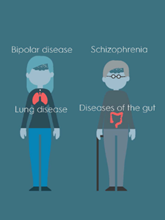People with mental disorders at higher risk of developing physical illnesses

People with mental disorders have a higher risk of developing various physical illnesses, such as a cardiovascular disease and a stroke. This is the outcome of an extensive study published in the leading New England Journal of Medicine in which the Groningen researchers Professor Peter de Jonge and Dr. Annelieke Roest (University of Groningen, Department of Developmental Psychology) participated. According to the researchers, the results are of great importance because mental disorders are more likely to reveal themselves rather than physical illnesses. Thus, a mental disorder can be an early signal to actively monitor someone in order to prevent physical complaints. For the study, an international research team analyzed data from more than 5.9 million Danes that were monitored for the presence of mental disorders and physical diseases between 2000 and 2016.
More information:
-
Professor John McGrath, from UQ’s Queensland Brain Institute and Denmark’s Aarhus University (teamleader international team of researchers)
-
Association between Mental Disorders and Subsequent Medical Conditions, N Engl J Med 2020;382:1721-31 / DOI: 10.1056/NEJMoa1915784
More news
-
03 February 2026
‘Such willpower’
-
20 January 2026
Alcohol, texting, and e-bikes
-
13 January 2026
Lonneke Lenferink joins The Young Academy
